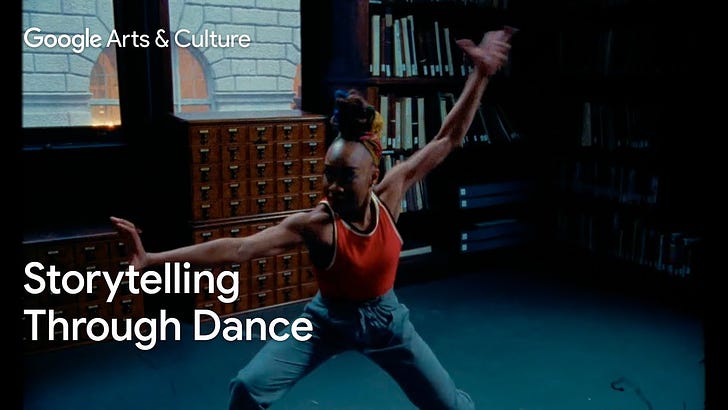Danceletter 25
I know this is allegedly a newsletter about dance, but dance is not really on my mind tonight. My heart is heavy and my mind overfull with images from the past few days, still accumulating, of police inflicting violence on protesters for demanding an end to the racist brutality of police. Two NYPD vehicles plowing straight into a crowd. An officer yanking down the mask of a man with his hands up and pepper-spraying his face. Another officer pushing a woman to the ground so forcefully she had a seizure. All made more distressing by the tepid response of New York City’s mayor, who excused the officers driving those vehicles (they “were in an impossible situation”), who said “I do believe the NYPD has acted appropriately,” and who claimed that “everyday New Yorkers” don’t support the protests in the streets. Who is he talking about?
I haven’t (yet) been out in the streets myself, but I am grateful to those bravely showing up mid-pandemic, friends and strangers. I also know that gratitude, or “solidarity” (a word I use a lot in my capacity as academic union organizer), means very little without action. I could go on about my feelings (anger, grief, guilt, shame), or attempt some analysis of the cultural moment. Instead I want to devote this edition of Danceletter to offering a few simple, concrete actions that people — especially white people — can take in the service of dismantling white supremacy.
I know there are many such lists circulating on the internet, and I don’t claim to have any “right answers” (imagine). These are just a few small actions that I personally have taken or plan to take, and I share them in the hopes that others might feel moved to do the same.
1) Attend Undoing Racism: Undoing Racism is the cornerstone workshop of the People’s Institute for Survival and Beyond (PISAB), a 40-year-old organization that supports ongoing anti-racist efforts in communities and institutions. The workshop has drawn many participants from the dance world, as a component of the Summer Leadership Institute hosted each year by the Brooklyn-based dance company Urban Bush Women. It is also offered all over the country for various workplaces and groups of workers, but you don’t have to be affiliated with any organization to participate.
I attended independently a couple of years ago, encouraged by a friend who had done the same. For me it was an opportunity to examine my unconscious biases; to become more vulnerable and open, less fearful and defensive, in talking and writing about race; and to better understand how systemic racism operates in the United States. To be clear, it’s not like you attend this three-day program and become some sort of expert anti-racist (that’s not the point). I see it as one step in a process of learning and listening that, for white people, never really ends.
I’m not sure if the workshops are currently happening (they very much depend on in-person interaction), but check the PISAB calendar for updates. If you’re curious about the training for yourself or an institution you’re a part of, feel free to reach out to me, and I can tell you more about my experience.
2) Tune in to The Dance Union’s Town Hall: This one’s especially for anybody working in the dance field (which I imagine is most Danceletter readers). The Dance Union, a podcast and hub for dance activism founded by Melanie Greene and J. Bouey, has organized a virtual gathering, “Town Hall for Collective Action: Dismantling White Supremacy in Dance Institutions” that will take place tomorrow, Monday, June 1 at 7 p.m. EDT. One impetus for the event was Nana Chinara’s recent Open Letter to Arts Organizations Rampant with White Supremacy, directed toward Gina Gibney and the Lower Manhattan dance organization she runs. I recommend clicking that link and reading the whole letter. (You can also read Gina’s response here.)
The Dance Union writes on Instagram that “The Town Hall’s intention is to hold a space for our dance community to express their anger, witness the grief of our community, and synthesize information into action.” It’s free to attend, but consider donating through Venmo (@Dance-Union) or Patreon to support The Dance Union’s important work. And follow their Instagram for updates about the event. (They’re at capacity for Zoom attendance but will be posting a live-stream link.)
3) Donate to Bail Funds: Especially if you can’t be in the streets, donating to bail funds, even in small amounts, is one way to support those who are putting their bodies on the line and risking arrest. A few funds I’ve seen widely promoted (and have given to myself): the Minnesota Freedom Fund, the Louisville Community Bail Fund, and the Brooklyn Community Bail Fund. (A related reading suggestion: this NYT op-ed on defunding the police and creating alternatives to policing.)
For more concrete actions you can take, especially in New York, I found this thread by Rachael Bedard, a doctor working in the NYC prison system, to be helpful. I also highly recommend listening to Rep. Alexandria Ocasio-Cortez, NYC Public Advocate Juumane Williams, Dr. Cornel West, and the cheers that erupted when an MTA bus driver refused to transport arrested protestors from Barclays Center.
I started out by saying that dance isn’t on my mind, but of course, to some degree, dance is always on my mind. I’ll sign off with this short-film version of Camille A. Brown’s ink, the culmination of her trilogy on Black identity, filmed at the Brooklyn Historical Society. (The stage version will stream here on Weds, June 3, at noon EDT.)
Stay safe, and write back if you want to talk about anything I’ve written here.



